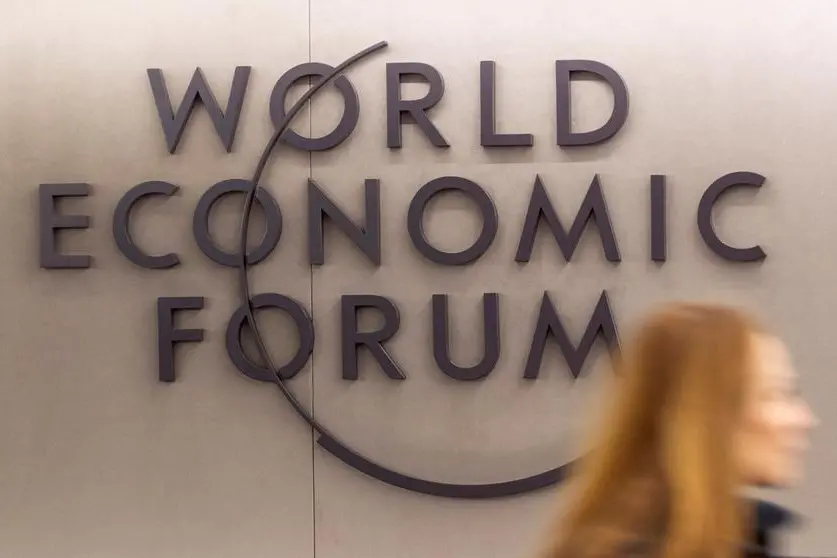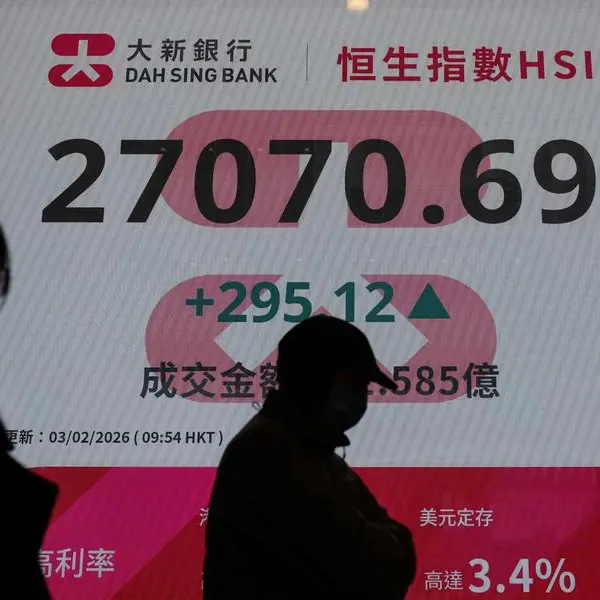PHOTO
The world’s leaders, economists, billionaires are now gathered in Davos, Switzerland for The World Economic Forum annual meeting on global politics, economics and social issues.
The theme of the 53rd annual meeting is “Cooperation in a Fragmented World”.
Zawya has compiled all the updates from Davos.
Saudi Aramco CEO says oil demand to pick up on China, aviation recovery
Saudi Aramco, the world’s largest oil company, is confident demand will pick up sharply this year as China reopens its economy and the aviation market recovers, Bloomberg reported, CEO Amin Nasser as saying at the World Economic Forum in Davos.
“We are very optimistic about the return of demand to the market,” he said, adding there are good signs from China, with further economic recovery likely in the coming months.
Jet fuel demand is now about one million barrels a day below pre-pandemic levels but going up, Nasser said, which is nearly half than a year ago.
Nasser said that companies need to invest more in oil production.
Idle capacity is at two million barrels a day, just above aggregate demand of 100 million barrels, but may fall as China ends its coronavirus lockdowns, the CEO noted.
Saudi Arabia changing no-strings aid: Minister
Saudi Arabia's finance minister said on Wednesday the kingdom is changing the way it provides assistance to allies, shifting from previously giving direct grants and deposits unconditionally.
"We used to give direct grants and deposits without strings attached and we are changing that," Mohammed Al-Jadaan said, adding the Kingdom was encouraging countries in the region to make reforms.
DP World forecasts further freight rate fall as demand slows
DP World expects freight rates to drop by a further 15% to 20% in 2023, with the worst still to come as demand slows, the Dubai-based global logistics company’s deputy chief executive and chief financial officer Yuvraj Narayan told Reuters.
Investcorp targets Indonesia to expand Southeast Asia footprint
Bahrain-based Investcorp is working on multiple initiatives in Indonesia, including one in partnership with the nation’s sovereign wealth fund as it seeks to expand its footprint in Southeast Asia, the firm’s co-chief executive officer Hazem Ben-Gacem.
Saudi open to talks on trade in currencies other than dollar
Saudi Arabia's Finance Minister Mohammed Al-Jadaan said that the kingdom is open to discussions about trade in currencies other than the US dollar, Bloomberg TV reported.
“There are no issues with discussing how we settle our trade arrangements, whether it is in the US dollar, whether it is the euro, whether it is the Saudi riyal,” he stated.
BlackRock US inflows dwarf $4bln lost in ESG backlash - CEO
BlackRock, the world’s biggest asset manager, lost around $4 billion in assets under management as a result of a political backlash against environmental, social and governance (ESG) investing in the United States, its chief executive Larry Fink told a Bloomberg News event.
He added that the asset management group took in $230 billion over the course of 2022 from US clients.
Taiwan-based firms to invest $2.5 bln in battery swapping network in India
India’s Maharashtra state has signed a deal with Taiwan’s Gogoro and automotive system maker Belrise Industries under which the two firms will invest $2.5 billion over eight years in building battery-swapping infrastructure across the state.
Germany may not need full €200bln fund for energy crisis
Germany probably will not need the full 200 billion euros ($217.26 billion) earmarked for the government's response to protect households and companies from the impact of soaring energy prices, Finance Minister Christian Lindner said on Tuesday.
Bharti Airtel to roll out 5G across India by March 2024: Chairman
Bharti Airtel expects a complete rollout of 5G services across India by March 2024, company Chairman Sunil Bharti Mittal told India’s Moneycontrol.com business portal.
“We’re rolling out 5G starting with key cities and should be able to complete 5G services across India by March 2024,” he said.
OPEC’ cautiously optimistic’ on global economy
The Organization of the Petroleum Exporting Countries (OPEC) has a “cautiously optimistic” outlook on the global economy, Bloomberg News reported, citing OPEC Secretary General Haitham Al-Ghais.
The economy is showing signs of improvement with increased oil demand from China, even if this positive trend is bogged down by other factors, he said.
OPEC sees signs of improvement following the Chinese government’s decision to relax tough Covid-19 restrictions.
IMF’s Georgieva says growth will bottom out in 2023
The International Monetary Fund’s (IMF) Managing Director Kristalina Georgieva said that the days of her institution giving regular global growth downgrades are nearly over.
“I don’t see a downgrade now, but growth in 2023 will slow down,” Georgieva told CNBC.
“Our projection is that we will go by half a percentage point down vis-a-vis 2022. The good news though is that we expect growth to bottom out this year and 2024 to be a year in which we finally see the world economy on an upside,” she added.
WEF says global recession seen likely in 2023
Two-thirds of private and public sector chief economists surveyed by the World Economic Forum (WEF) expect a global recession in 2023, the Davos organiser said as business and government leaders gathered for its annual meeting.
WTO's Ngozi warns on green 'subsidisation race'
World Trade Organization (WTO) Director-General Ngozi Okonjo-Iweala warned world powers not to engage in a "subsidisation race" as countries seek to generate investments in their green energy transitions.
UBS still hiring and in growth mode, says CEO
UBS is hiring with the Swiss bank in “growth mode,” CEO Ralph Hamers said.
“We are very cautious in hiring but still hiring. We are very much looking at what are some of the critical jobs that we need to fill,” he told CNBC.
IEA hails US inflation eduction act hailed as a game changer for climate
International Energy Agency (IEA) executive director Fatih Birol said on Tuesday that new legislation by the United States aimed at combating domestic inflation was the most important climate agreement since the Paris Accord.
EY sees favourable conditions by year-end or early-2024 to list arm
EY Global expects favourable market conditions by the end of this year or early 2024 to list its consulting and a part of the tax business if a proposed split of its accounting and consultancy arms is approved, a company official said.
"(The split) will involve a debt raise, and a form of capital transaction - both of those are influenced by market conditions," said Andy Baldwin, global managing partner-client service at EY.
Hong Kong’s Animoca Brands to double down on investments amid crypto winter
Hong Kong-based blockchain gaming developer Animoca Brands aims to grow its portfolio of companies by more than 30% by the end of this year as it doubles down on investments in a crypto winter, its co-founder Yat Siu said.
Palantir CEO predicts hiring while preparing for economic slowdown
Palantir Technologies Inc is still looking to grow its headcount even as it scrutinizes its spending and confronts economic uncertainty, said its CEO Alex Karp.
The US software company in 2023 expects to add a couple hundred people to its roughly 3,500 staff, in line with prior years of expansion just as peers in the technology industry are firing people, he said.
South Africa plans to end load-shedding in 12-18 months
South Africa has a plan to improve energy provision that will end the need for any power cuts within the next 12-18 months, Finance Minister Enoch Godongwana said on Monday.
“Eventually in the next 12-18 months we will be able to say load-shedding is a thing of the past. That is the target,” Godongwana, told Reuters.
India’s ReNew Power exploring Egypt green hydrogen project
India’s ReNew Power, a unit of New York-listed ReNew Energy Global Plc, is studying opportunities to expand into green hydrogen in India, Egypt and elsewhere, its chairman and CEO said.
The company is now studying green hydrogen opportunities, specifically in Egypt, having signed a framework agreement during the COP27 climate conference last year, Sumant Sinha told Reuters.
State Street CEO says had no idea about leverage in LDI funds
State Street said it was unaware how much leverage was tied to liability-driven investment (LDI) funds, which came under extreme stress last year after UK government bond yields rocketed.
LDI funds are used by UK pension funds to help ensure they can pay pensions.
“We had no idea how much leverage was in the system,” State Street CEO Ronald O’Hanley said.
China reopens its doors with investment pitch to global elite
China’s Vice-Premier Liu He welcomed foreign investment and declared his country open to the world on Tuesday after three years of pandemic isolation.
Liu’s explicit pitch to global leaders made it clear that China wants international investors to play a key role in Beijing’s attempts to revive its slowing economy.
Saudi FM says Riyadh trying to find path to dialogue with Iran
Saudi Foreign Minister Prince Faisal bin Farhan Al Saud said the kingdom was trying to find a path to dialogue with Iran as the best way to resolve differences.
He said a decision by Saudi Arabia and other Gulf states to focus on their economies and development was a “strong signal to Iran and others in the region that there is a pathway beyond traditional arguments and disputes towards joint prosperity”.
EU to counter US climate game changer with own green deal
The European Union (EU) responded to US moves to boost its energy transition with its own plans to make life easier for green industry, saying it would mobilise state aid and a sovereignty fund to keep firms from moving to the United States.
European Commission head Ursula von der Leyen said the moves would be part of the EU’s green deal industrial plan to make Europe a centre for clean technology and innovation.
SAP CEO: World is entering the ‘next phase of globalisation’
The CEO of German tech giant SAP said the world is entering the next phase of globalization but he is largely optimistic on the outlook for technology despite challenges posed by higher interest rates and supply chain disruptions.
“We are entering from my perspective the next phase of globalisation,” SAP chief Christian Klein told CNBC.
(Editing by Seban Scaria seban.scaria@lseg.com )




















